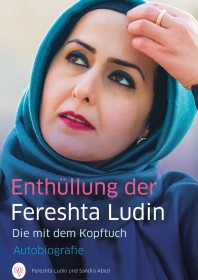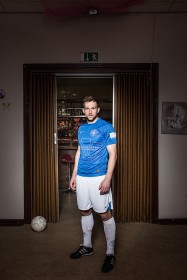A Conversation with Fereshta Ludin about the Headscarf Debate, Discrimination, and Her Hopes for the Future.
To win the right to work as a teacher in the classroom while wearing her headscarf, Fereshta Ludin had to go all the way to the German Supreme Court (see below). On 17 September 2015, she will join us as part of the series “New German Stories” to introduce her book Enthüllung der Fereshta Ludin. Die mit dem Kopftuch (“The Unveiling of Fereshta Ludin: The One with the Headscarf”). Rafiqa Younes and Julia Jürgens spoke with her in the lead-up to the event.

Book cover © Deutscher Levante Verlag
Ms. Ludin, did you ever guess that the first lawsuit you filed against your employers, in 1998 when you were 25 years old, would set off a nationwide debate about the headscarf ban?
You can’t really imagine something like that. I was still very young and idealistic. I wanted to work as a teacher and had no intention of provoking the public or any politicians.
From your perspective, was it worth it to go all that way through courts, becoming, as you did, a public figure – “the one with the headscarf” as the title of your book ironically references?
I don’t regret a single step along the way. I would have regretted much more, to have had to endure the injustice. I took an active stand against discrimination by going through the courts. Many other women were also affected. It was never my aim to become a public person. → continue reading
The Many Faces of Isaac and Ismael, Part 3
Everyday, hundreds of video clips get produced at our video box that is part of the exhibition “Obedience. An Installation in 15 Rooms by Saskia Boddeke & Peter Greenaway.” This month, we have been particularly taken by the multitude of languages spoken by our visitors who present themselves as Isaac or Ismael:
Lisa Albrecht, responsible for compiling the clips, is since able to introduce herself in a number of languages.
The 14th European Maccabi Games (EMG) are beginning tomorrow, 27 July 2015, in Berlin. More than 2,000 Jewish athletes from 36 countries will compete in 19 sports from football to fencing to chess. To accompany the games Tamar Lewinsky and Theresia Ziehe are producing a series of portraits with interviews, introducing a new member of the German delegation from Berlin every day here on the blog. They conducted the interviews on the grounds of the TuS Maccabi in Berlin’s Grunewald where Stephan Pramme also shot the portraits.
Alec-Ilya Pivalov (28), soccer

Alec-Ilya (28), soccer © Jewish Museum Berlin, photo: Stephan Pramme
Alec, why are you taking part in the European Maccabi Games?
It’s a terrific athletic event where you can meet a lot of interesting people from many different countries. By now there’s also a familial atmosphere in the German delegation so it’s just really nice to have the opportunity to participate. And of course it makes you and your family proud.
In 1936, Jewish athletes weren’t permitted to participate in the Olympic Games. Does the fact that some of the competitive events will take place in Berlin’s Olympic grounds – which were built for that Olympics – play a personal role for you?
There is an ambivalence because of course I know the history of this stadium. But in the meantime I associate it with other events: → continue reading

